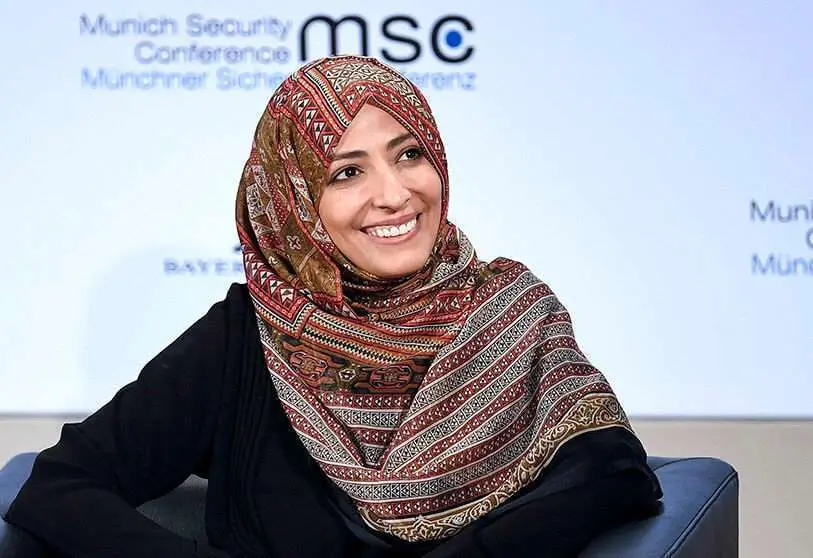Facebook Appoints Muslim Brotherhood Islamist to Supervisory Board

Facebook has sparked controversy over the controversial appointment of a Muslim Brotherhood member, Yemeni writer Tawakkol Karman, winner of the 2011 Nobel Peace Prize, to its new supervisory board.
The social network founded by Mark Zuckerberg has decided to create this 20-member Supervisory Board as "an external body to which members of our community can appeal some of the most significant and challenging content decisions we face. In a statement, he said he "expected members to make some decisions that we on Facebook won't always agree with - but that's the point: they are truly autonomous in their exercise of independent judgment.
The first disagreement arose from the election of Islamist Karman by a group of vice presidents, elected by Facebook, who subsequently selected the other 16 members.
The four vice presidents are former Danish Prime Minister Helle Thorning-Schmidt; Stanford Law School Professor Michael McConnell; Columbia Law School Professor Jamal Greene; and Universidad de los Andes Law School Dean Catalina Botero-Marino.
In addition to Karman, other members of the new board include Kenyan human rights activist Maina Kiai; Pakistani digital rights activist Nighat Dad; and former editor of the Indonesian publication Jakarta Post, Endy Bayuni.
Objectives of the Oversight Board
The creation of this new body aims to ensure that its decisions influence content moderation guidelines on both Facebook and Instagram and comply with the intention of avoiding the proliferation of false news, hoaxes and disqualifications as much as possible.
Brent Harris, director of public policy at Facebook, has said the company will "implement board decisions unless doing so would violate the law. In the coming months, the board plans to reach a total of 40 members.
Radicalization experts believe that Karman's choice to play this prominent role means that Facebook failed to recognize the link between the defense of the Muslim Brotherhood's ideology and extremist activity.
Several countries in the region have described the Brotherhood as a terrorist organization. The organization's terrorist links are being investigated in several Western nations. A number of al-Qaeda leaders have been initially active with the Muslim Brotherhood.
Facebook has been repeatedly criticized for not adequately addressing the proliferation of extremist ideologies on its platform. After suffering harsh criticism, including from European lawmakers, Facebook last year declared its intention to update its policy on "fighting hate and extremism".
However, last September the social network issued a statement discarding the link between terrorism and extremist ideology. "We are always looking to see where we can improve and refine our approach and recently updated the way we define terrorist organizations in consultation with experts in counterterrorism, international humanitarian law, freedom of expression, human rights and law enforcement," Facebook said. "The updated definition continues to focus on the behavior, not the ideology, of groups.
Karman, a member of the Muslim Brotherhood
When Tawakkol Karman won the 2011 Nobel Peace Prize for her "role in the Arab Spring protests", the Muslim Brotherhood's website, Ikhwanweb, posted a statement on Twitter identifying her as a "member of the Muslim Brotherhood of Yemen", which provoked strong controversy and criticism for her connection with the group.
Despite tactical disagreements over alliances in the Yemeni war, Karman is a leading figure in the Yemeni Islah Party, which is affiliated with the Muslim Brotherhood. Karman has repeatedly defended the Muslim Brotherhood, even describing the group as "one of the victims of official tyranny and terrorism in the region, which Trump supports and helps. He has said he believes the movement's role in the region will "necessarily" grow in the future.
Reactions
In media and social networks in the Middle East and North Africa, the reaction of many users to Facebook's choice of Karman has been one of confusion and derision because they say the Yemeni writer is better known for her Islamist activism and radical positions than for her commitment to public service.
Some experts point out that Facebook's real intention is to influence politicians and decision-makers in the West to avoid regulatory restrictions that could affect their income. The executive director of the Project Against Extremism (CEP), David Ibsen, has said that "Facebook continues to push misleading arguments to create confusion and fear among legislators in an effort to maintain the status quo and limit the liability of the technology industry. Ibsen has demanded that "instead of dictating to public officials how to maintain public safety, Zuckerberg and his company should instead stop their lobbying efforts and focus on keeping extremist and terrorist content off their platforms.
Other experts say Karman's election to Facebook's advisory board will increase suspicions about the social network's political trends and is unlikely to enhance the company's credibility in the Arab world.








